Turn any article into a podcast. Upgrade now to start listening.
Premium Members can share articles with friends & family to bypass the paywall.
Editor’s Note: For the week leading up to Thanksgiving, we’re unlocking The Morning Dispatch for everyone—no paywalls. If you’re a new reader or are on the free list, we hope you enjoy the complete TMD experience. And if you’re a member, thank you for your support. We hope you’ll consider forwarding these next few editions to friends and family you think would value our work.
Happy Wednesday! A solid gold toilet sold at Sotheby’s last night for $12.1 million—the winner narrowly outbidding the decorators at 1600 Pennsylvania Avenue.
Quick Hits: Today’s Top Stories
- During a White House meeting with President Donald Trump Tuesday, Mohammed bin Salman, the crown prince of Saudi Arabia, signed an agreement for the U.S. to sell F-35 fighter jets to his country and a joint declaration moving toward cooperation between the two countries on civil nuclear energy. When an ABC News reporter asked a question about the 2018 murder of Washington Post journalist Jamal Khashoggi—which a 2021 U.S. intelligence report concluded had been ordered by bin Salman—Trump replied, “You don’t have to embarrass our guest by asking a question like that,” and remarked, “a lot of people didn’t like that gentleman.” The prince claimed that he regretted Khashoggi’s death and that there had been an internal investigation conducted in his government into the matter.
- The House of Representatives passed a bill Tuesday demanding that the Justice Department releases all files related to its investigation into Jeffrey Epstein, by a 427-1 vote. Later that evening, the Senate agreed to pass the measure by unanimous agreement as soon as it arrived in the chamber. President Donald Trump had lobbied against the bill, but changed his position on Sunday. Trump is expected to sign the bill into law, although Attorney General Pam Bondi will retain the power to withhold any information that identifies any victims or impairs federal investigations. The sole opposing vote in the House came from Louisiana Rep. Clay Higgins.
- One man was killed and three others injured Tuesday after two Palestinian men drove their car into a crowd at the Gush Etzion Junction in the West Bank before getting out and stabbing people. Israeli security forces fatally shot both attackers before finding and disarming explosives in their car. One of those injured—a woman in her 50s—is in critical condition after seemingly being mistakenly hit by Israeli gunfire. Unrelated to the attack, later that day, the Israel Defense Forces conducted an air strike on the Ain al-Hilweh Palestinian refugee camp in Lebanon. Officials claimed the strike was targeting a Hamas training and “military compound.” Lebanese authorities say 13 people were killed, and at least four others were wounded. Hamas denies having any “military installations in the Palestinian camps in Lebanon,” and claimed the IDF hit a “group of young boys” playing on an open sports field. Separately, an Israeli human rights group on Tuesday released a report claiming that at least 94 Palestinian prisoners and detainees had been killed while in Israeli custody over the past two years, alleging a pattern of cover-ups and targeted killings.
- Polish Prime Minister Donald Tusk on Tuesday said that two Ukrainians accused of working for Russia were suspected of being behind the weekend’s railway line explosion in the country and that they had already fled the country. Kremlin spokesman Dmitry Peskov said the accusations were the result of “Russophobia.” Ukrainian President Volodymyr Zelensky was supposed to meet with White House envoy Steve Witkoff in Turkey today, in an effort to restart peace talks between his country and Russia, but Witkoff has postponed the trip. Meanwhile, Axios reports that the Trump administration has been consulting Russia on a draft plan to end the war in Ukraine. Russian forces fired 48 missiles and 476 drones into Western Ukraine last night, killing at least 16 people in the city of Ternopil, and injuring more than 64 others, including 14 children.
- U.S. District Judge James Boasberg ruled for technology company Meta in an antitrust lawsuit brought against it by the Federal Trade Commission, writing that Meta’s acquisitions of social media platforms Instagram and WhatsApp did not constitute illegal attempts to monopolize a market. The decision, released Wednesday, brought an end to the federal government’s five-year campaign against Meta, in which it sought to have the company spin off some of the technology firms it had acquired. FTC spokesman Joe Simonson said the deck was “stacked against us” by the fact that Boasberg—whom President Donald Trump has called for impeaching—was presiding over the case.
The Remaking of U.S. Foreign Aid Programs
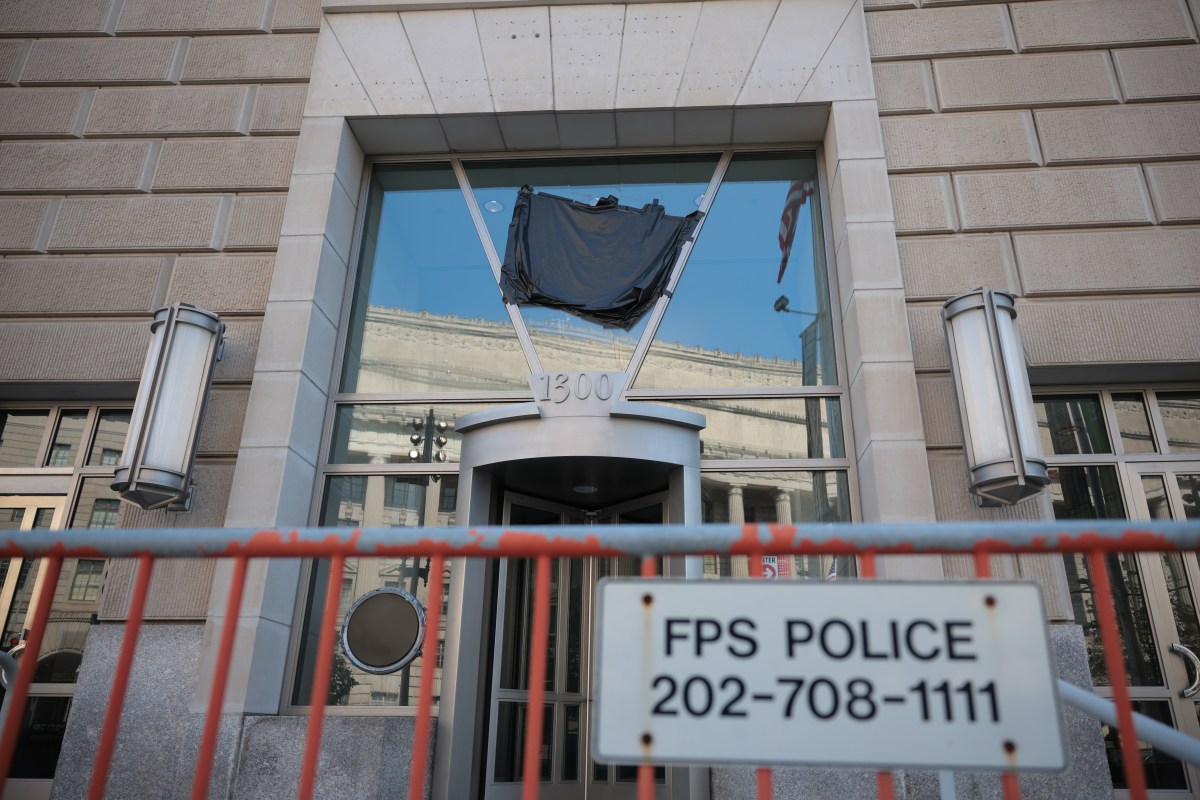
When civil war erupted in South Sudan in 2013, Jeremy Konyndyk, the director of the U.S. Agency for International Development’s Office of Foreign Disaster Assistance, rolled out the U.S. government’s humanitarian aid playbook. As the conflict between two opposing government factions quickly spiraled into multi-sided infighting and mass atrocities, U.S. officials funneled money to distribute food aid, nutritional interventions like peanut paste, and clean drinking water among civilians fleeing the fighting.
But, as Konyndyk, now the president of Refugees International, told TMD, disaster response requires far more than emergency food and water supplies. He designated medical teams to deploy to areas of the country at risk of famine, as malnutrition-related disease usually causes more deaths than outright starvation. Social workers and doctors attempted to provide basic health care, especially for women, who were at greater risk of violence and often in need of pregnancy care. And tens of thousands of households were provided with fishing and agricultural kits to blunt the long-term need for emergency aid.
Now, a crisis has engulfed the region again—this time in Sudan. But as of this year, far fewer of the initiatives that Konydyk would have overseen are being carried out.
It’s a sign that the restructuring of the U.S. government’s foreign assistance programs, launched at the start of President Donald Trump’s second term, is starting to have repercussions. The U.S., formerly the global leader in international humanitarian assistance, has radically altered its approach to foreign disasters—from civil wars to hurricanes to disease outbreaks. It’s also spending far less money: The Trump administration’s proposed budget for humanitarian programs for fiscal year 2026 is 46 percent lower than 2025’s, while the administration is also “clawing back” money meant to be spent in 2025.
Typically, The Morning Dispatch’s main story is cut off here, with the full item reserved for paying members. We are unlocking the newsletter this week to give free readers a taste of what they’re missing out on. To get the full version in your inbox every day—and unlock all of our stories, podcasts, and community benefits—join The Dispatch as a paying member.
While some funding earmarked for aid projects has resumed, bureaucratic reorganizations and the cancellation of swaths of programs, most notably the shuttering of USAID, have narrowed the scope of the country’s foreign assistance programs from long-term projects to narrow and shifting crises.
The new administration cut 83 percent of USAID’s projects and transferred the rest to the State Department’s Bureau of Population, Refugees, and Migration. “This era of government-sanctioned inefficiency has officially come to an end,” Secretary of State Marco Rubio announced in a July Substack post. In September, the House Foreign Affairs Committee approved his plan to move the remaining functions of USAID, traditionally a mostly independent agency, under the State Department’s auspices.
Researchers have attempted to map the effects of the abrupt end of so many aid projects, ranging from AIDS-prevention programs to women’s health clinics to projects designed to build agricultural resilience against drought and disease. A June study in The Lancet estimated that by 2030, the ongoing cancellation of USAID programs could result in around 14 million preventable deaths. Impactcounter.com, a model assembled by Boston University mathematician Brooke Nichols, estimates that, so far, the discontinuation of various aid programs has led to roughly 625,000 additional deaths from diseases such as malaria and cholera, as well as malnutrition.
But modelling the effect of aid that makes real but small changes—like hygiene kits in Cameroon—is a complex task. “It’s not a body-bag situation,” Nichols noted, pointing out that the difference between 10 people dying of malaria a year in a given area, versus five, is challenging to measure. But Nichols also argued that her model made many conservative assumptions, such as presuming that many programs would continue to distribute funding at the same rate.
And experts and practitioners who spoke to TMD attested to an undeniable on-the-ground reality. “The direction of child mortality is really problematic,” Vincent Smith, the director of agricultural policy studies at the American Enterprise Institute and an expert on global food security, told TMD.
With food aid, for example, Smith noted that while some experts were moved from USAID to the State Department, aid distribution was still “enormously fractured” compared to before, adding that his own projections showed that the government had failed to spend around $1.2 billion of the $2 billion allocated to decades-old flagship program Food for Peace in 2025.
Bill O’Keefe, the executive vice president for mission, mobilization, and advocacy at Catholic Relief Services (CRS), told TMD that his organization had 80 projects with a total value of around $500 million and thousands of staff abruptly terminated with little warning or rationale. “There really wasn’t visibility into the process or access to the people who were ultimately responsible,” O’Keefe said.
Later, O’Keefe learned that the administration only sought to fund projects it deemed “lifesaving.” In practice, this meant abandoning programs like Shared Future, a CRS-run program that offered job training and small business grants for Christians and other religious minorities in northern Iraq displaced by the Islamic State. “The challenge is, you can give a person a fish today,” he said, “but you don’t teach them to fish. You’re gonna just be stuck handing them more fish.”
The shift in focus to short-term aid also eliminates one of USAID’s core competencies, said J. Brian Atwood, who was the administrator of USAID for more than six years under former President Bill Clinton. “I call USAID the ‘crisis averted’ agency,” he told TMD, pointing out that many of its projects are aimed at preventing disasters before they happen, such as a would-be famine threatening more than 16 million people in the Horn of Africa in 2000 during a severe drought. Early warning systems enabled USAID to rush food into the area before famine set in.
Other places not currently experiencing an acute crisis have lost almost all USAID funding. Haydee Diaz, the country officer for Catholic Relief Services in Honduras and the Caribbean, told TMD that money for large-scale projects “disappeared overnight.” For Prosperamos, a program aimed at educating farmers in techniques to grow more crops that would last through the lean season, preventing the need to take out loans or consume livestock, “we were asked to stop all activity immediately,” she said.
Long-term resiliency programs, like those authorized under the Global Food Security Act of 2016, were a hallmark of USAID’s development mission, said Dina Esposito, the former director of the Food for Peace program and USAID’s Bureau for Resilience, Environment, and Food Security. In one of her roles, Esposito led a team of around 500 agronomists, food scientists, soil scientists, veterinarians, and geneticists. But none of them survived the Trump administration’s purge. “Not a single one of them was picked up by the State Department,” she said. “Virtually nothing has been sustained.”
Esposito also said that administration officials are discussing moving the Food for Peace program, which buys U.S. agricultural goods in bulk and packages them as aid, from the State Department to the U.S. Department of Agriculture. Such a move would risk that “it will essentially become a commodity-driven program to serve first and foremost the commodity interest groups, and secondarily, the hungry person,” she said.
Esposito noted that during her time at USAID, food producers had attempted to get the U.S. government to purchase products that were inappropriate for aid missions, such as canned salmon for regions with 100-degree heat or walnuts that would perish during ocean voyages. Both Smith and Esposito argued that moving Food for Peace to the USDA, as some Midwestern senators have advocated, risks creating a program that prioritizes bulk purchases from American farmers.
The State Department has made much of the fact that it still provides emergency aid in certain situations. A Disaster Assistance Response Team and tens of millions of dollars in funding were deployed to the Caribbean in the wake of Hurricane Melissa this past week. And $295 million in aid is allocated to combating the ongoing humanitarian crisis in Sudan—though, according to the U.N.’s aid donor tracker, most of those funds were transferred before USAID’s closure.
And that figure is still less than half of what was allocated to Sudan in 2024, despite the conflict’s mounting civilian toll. It’s also challenging to determine how that money is being spent, as the Trump administration has dismantled relevant government watchdog agencies.
As for the programs still receiving funding, O’Keefe told TMD that grants were being renewed on three- or six-month bases, making it difficult to plan for responses to crises that can last years. “You’re in sort of perpetual anxiety,” he said. O’Keefe also noted that for countries with poor diplomatic relationships with the U.S.—most notably Taliban-run Afghanistan, whose people are currently suffering from unprecedented levels of malnutrition—approval of new projects has dried up.
American foreign aid has not ceased to exist—but its character has changed, from one focused on long-term, development-oriented goals to a narrower focus on rapid emergency response and political imperatives.
Humanitarian workers worry that such an approach will only make future crises worse: “The mainstream media presents a constant stream of international disasters,” O’Keefe said, “and not enough of, ‘Well, let’s stand back. Why did this happen?’” The U.S. government may have stopped asking too.
Today’s Must-Read
More than two months—and at least 83 fatalities—into the U.S. campaign against suspected drug boats in the Caribbean Sea and eastern Pacific Ocean, the operation’s overall purpose and strategy remain unclear. Is the goal to oust President Nicolás Maduro’s dictatorial regime? Or is this a broader battle against drug trafficking writ large, as Defense Secretary Pete Hegseth insists? Mary Speck, former executive director of the Western Hemisphere Drug Policy Commission, cites five decades of evidence from the “war on drugs” to argue that military force is not as impactful as some of our military leaders might hope. Worse, she warns that potential regime change could trigger prolonged chaos—leading Venezuelan drug smugglers, arms traffickers, and other criminal actors to grow even more powerful.
Toeing the Company Line
Rage Against the Machine
House Democrats take a Trumpy turn.
In Search of a Defense Doctrine
The Trump administration’s incoherent military strategy leaves the U.S. vulnerable to global threats.
What Happens When AI Answers Your 911 Call?
More and more emergency dispatch centers are using AI to field non-emergency calls.
No Checks, No Balance
Why it’s time to reform the pardon power by amending the Constitution.
Postliberalism: Flirting with Fascism | Interview: George Weigel
'I’m not getting the eugenic vibe.'
In Other News
Today in America:
- The White House is starting to dismantle the Department of Education, outsourcing six of its offices to other agencies.
- A federal court has blocked Texas’ new congressional map, with Judge Jeffrey Brown writing in the majority opinion that “substantial evidence shows that Texas racially gerrymandered the 2025 Map.”
- Texas Gov. Greg Abbott officially designated the Council on American-Islamic Relations (CAIR)—along with the Muslim Brotherhood—a “foreign terrorist organization.”
- The Gustav Klimt painting “Portrait of Elisabeth Lederer” sold for $236.4 million Tuesday night at Sotheby’s, making it the most expensive modern artwork ever sold at auction, and second most expensive piece of art ever auctioned.
Around the World:
- The MacArthur Foundation awarded $100 million to Sentinel, a private pandemic prevention network that operates across Africa.
- Belgian police arrested eight people Tuesday morning in connection to a plot to assassinate the Brussels chief prosecutor, Julien Moinil.
- Eswatini became the first African country to receive lenacapavir: a twice-yearly HIV prevention injection.
On the Money:
- Cybersecurity firm Cloudflare suffered a major outage for four hours yesterday morning, taking down websites like X, ChatGPT, and website-outage-tracker Downdetector.
- Toyota announced it will invest $912 million in American plants, across five Southern states, to increase production of hybrid vehicles. This is part of its previously announced plan to invest up to $10 billion in the U.S. by 2030.
- Google released its latest AI model, Gemini 3, which markedly improves upon previous Google models on AI benchmarks, particularly for reasoning and coding performance.
- Microsoft has partnered with Nvidia and AI company Anthropic as part of a new AI infrastructure deal. Nvidia will invest $5 billion in Anthropic, and Microsoft will invest $10 billion, and Anthropic commits to buy $30 billion in computing capacity from Microsoft’s Azure cloud computing platform.
Worth Your Time:
- “The White House Intervened on Behalf of Accused Sex Trafficker Andrew Tate During a Federal Investigation” (ProPublica)
- Michael Scherer and Ashley Parker report on Trump’s post-election fundraising. (The Atlantic)
- David Yaffe-Bellany, Spencer Woodman, and Sam Ellefson investigate the dirty money passing through cryptocurrency exchanges. (New York Times)
- Katherine Dee argues that the current far-right has been fundamentally shaped and created by the internet. (Persuasion)
- A detailed explainer video on the health risks of excess body fat. (Kurzgesagt)
Presented Without Comment
BBC: US Will Give Visa Appointment Priority to World Cup Ticket Holders
Also Presented Without Comment
Politico: Chinese Agents Using LinkedIn To Target British MPs
Also Also Presented Without Comment
Associated Press: Australian Prisoner Sues for His ‘Human Right’ To Eat Vegemite
Let Us Know
Have any thoughts or questions about today’s newsletter? Drop us a note in the comments or by emailing us at tmd.questions@thedispatch.com. We read every submission, and your message could be featured in an upcoming “Behind the Scenes” segment.
Thanks again for being a Dispatch member. If you know someone who would appreciate our approach to the news, please forward them this free edition of The Morning Dispatch. Your support helps us grow—and allows us to do the kind of reporting that’s worth your time.
Have any thoughts or questions about today’s newsletter? Become a member to unlock commenting privileges and access to a members-only email address. We read every submission, and answer questions in the following edition of TMD.




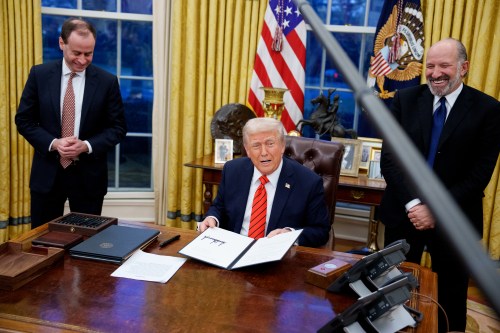
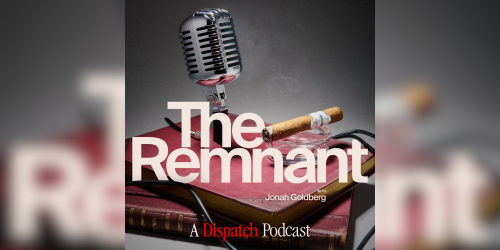





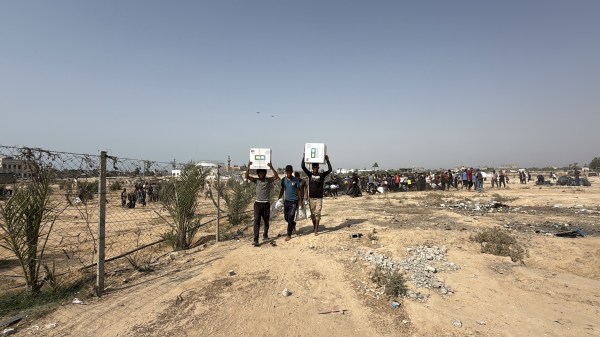

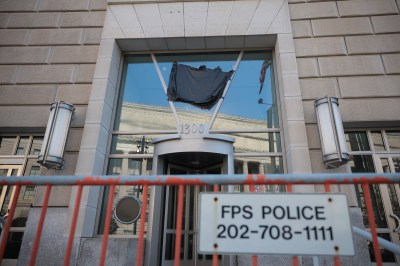
Please note that we at The Dispatch hold ourselves, our work, and our commenters to a higher standard than other places on the internet. We welcome comments that foster genuine debate or discussion—including comments critical of us or our work—but responses that include ad hominem attacks on fellow Dispatch members or are intended to stoke fear and anger may be moderated.
With your membership, you only have the ability to comment on The Morning Dispatch articles. Consider upgrading to join the conversation everywhere.